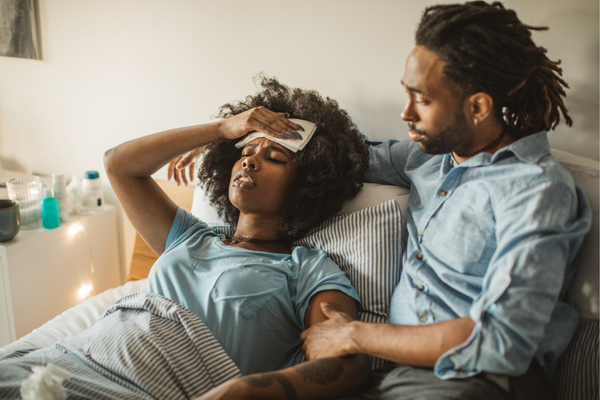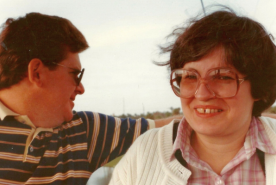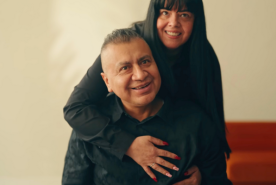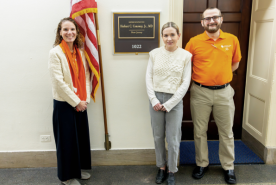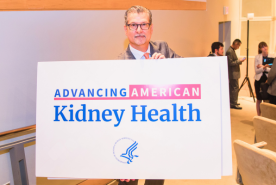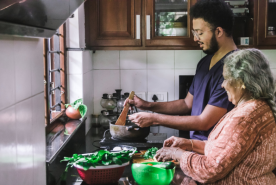December 20, 2022
With COVID-19 guidelines changing and new treatments being created, some people with kidney disease, those on dialysis, and kidney transplant recipients may be unsure what to do next. We’re here to help with up-to-date resources, guidelines, and COVID-19 survivor stories to help you create an informed plan to stay safe in the future.
Why did you get the COVID-19 vaccine and boosters?
The CDC advises that everyone stay up to date with their vaccines and boosters. While it may feel annoying to continue getting these shots, many people with kidney disease believe the benefits vastly outweigh potential discomfort.
“I experienced some side effects from the vaccine and boosters similar to having COVID,” said Jesse Morales, an IgAN patient. “I was a little achy but it was worth it because so many people have died from COVID-19 and kidney patients are especially vulnerable. It was always important to me that I protect myself.”
Evusheld or monoclonal antibodies are recommended in addition to the vaccine for those who are moderately to severely immunocompromised and those who may have a weak immune response to the COVID-19 vaccination.
What did catching COVID-19 feel like?
Some of the most common effects of COVID-19 include fever, cough, and shortness of breath. For Anne Dalin, a kidney transplant recipient, it started with a mild headache.
“I got really tired and the headaches got a little bit worse. I developed a hacking cough,” said Anne. “The transplant department and the doctors said, ‘We want you to start testing your oxygen levels.’ They told me that if it got to a certain level, I should go to the emergency room.”
Fortunately, Anne managed COVID-19 while at home, but everyone else wasn’t so lucky. Patrick Gee, another kidney transplant recipient, developed long-COVID for nearly a year and had to go to the hospital for treatment.
“I was very feverish–my temperature was around 101. I had body aches, chills, and a lot of coughing,” said Patrick. “I ended up being hospitalized.”
Symptoms of long COVID include:
- Extreme fatigue
- Shortness of breath
- Pain
- Difficulty sleeping
- Racing heart rate
- Memory and concentration problems
How were you treated for COVID-19?
There is no cure for COVID-19. However, there are treatment options that can help lessen the effects of the virus.
These options include:
- Antiviral drugs: Medicine that slows the growth of viruses.
- Monoclonal antibodies: Lab-created antibodies that trigger an immune response to kill cells infected with the virus.
- Pain and fever reducers: Taken as suggested by a healthcare professional and available over-the-counter.
Elizabeth Fortune, a kidney failure patient on dialysis, and Liz Lusk, a kidney transplant recipient, received monoclonal antibodies after catching COVID-19.
“My pharmacist called in a favor to the chief medical officer at one of the other hospitals. She said, “I have a patient who needs the monoclonal antibodies because she’s on dialysis. The next day I had them,” said Elizabeth. “I will forever be grateful to my pharmacist for working hard to ensure I got the treatment she felt would be best for me.”
“They told me that as soon as I got the antibodies I would feel better right away,” said Liz. “For me it wasn’t instant, but I did feel much better going forward.”
How do you plan on staying safe moving forward?
People who are immunosuppressed may not have complete protection from COVID-19, even if they are vaccinated, boosted, and are getting an Evoshield shot every six months. Wearing a well-fitting, high-quality N-95 mask in public can help.
“I wear a mask every time I leave the house whether that is traveling or going to the grocery store,” said Patrick. “The CDC has caused concern in the kidney community when they started talking about taking the masks off and changing mandates. I think those who are at risk know what to do.”
Anne agrees: “I do not go out and about without a mask. I’m not ready to take that chance. As much as people seem to think that COVID is gone, it’s not.”
Other ways to stay protected include:
- Social distancing.
- Avoiding poorly ventilated or crowded indoor settings.
- Washing hands with soap frequently and using hand sanitizer with at least 60% alcohol.
What do you want people with kidney disease to know about COVID-19?
Living in the COVID-19 era can be scary, but Jesse wants you to know that it’s okay to ask for help.
“It’s okay to be uncertain and have anxiety around the pandemic. Try to be more open with your doctors and keep an eye on your mental health. You may want to seek out therapy and talk it out. That’s been very helpful for me,” said Jesse. “I’ve also connected with people who have kidney disease online more than ever through NKF.”
Resources for mental health include:
- NKF Communities: Ask questions and share experiences with others in the kidney community.
- NKF Cares: Receive individualized resources from trained professionals through our patient information center.
- NKF Peers: Get matched with a peer mentor who’s been through a similar experience with kidney disease.
Join our NKF Transplant Facebook group to connect with others in the kidney community
